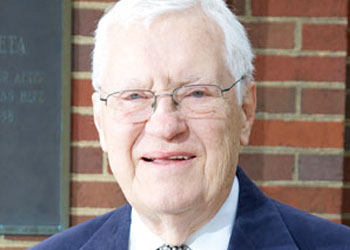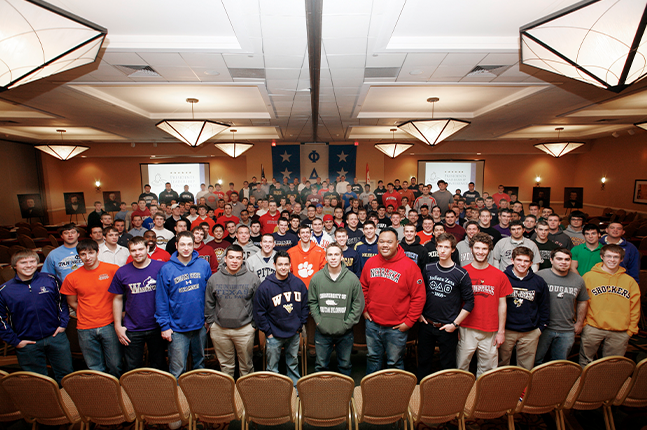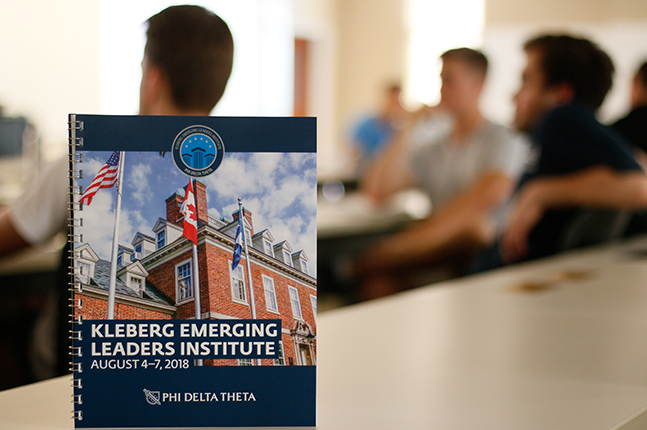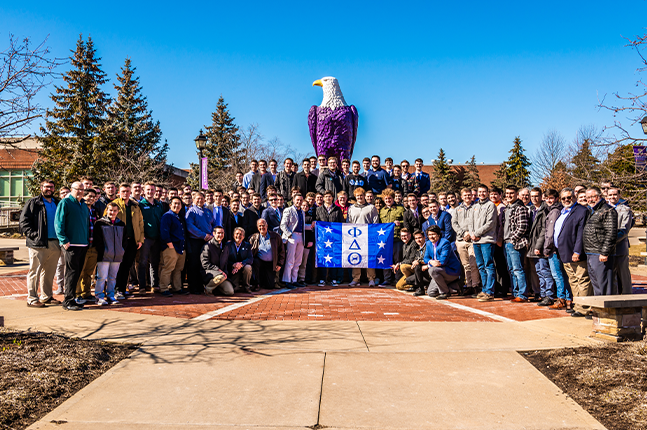How George Banta Sr. became an initiated member of Delta Gamma sorority
Ask 100 Delta Gammas the name of the only male member of their fraternity, and you’ll get 99 correct answers. Ask the same question to 100 members of Phi Delta Theta and you’ll be lucky to find one person who knows the answer.
The person in question is the man who served as the very first president of Phi Delta Theta’s General Council, George Banta, Franklin-Indiana 1876. He was elected to that position at the age of 23 and served the 1880-1882 term. By that time he had already become a member of Delta Gamma.
To understand how this situation could have developed, one must acknowledge that the fraternity system was not bound by the rules which exist today. Here’s how Brother Banta explained it in 1907:
“I may explain here that in the elder day of thirty years ago, here in the West at least, fraternities on special occasion affiliated students in colleges in which they had no chapters, by registered mail. This, of course, will seem most strange to fraternities members in this day. But it was then the day of rapid extension and fierce rivalry. Fraternities were not centralized as they are today, and methods were then more lax and crude. Every fraternity and sorority in the West initiated honorary members and many men and women, valuable to them in their fight for not only growth, but existence as well, were oft quoted and oft boasted members.”
Several of Phi Delta Theta’s early chapters were chartered by the method explained above.
Returning home from Phi Delta Theta’s 1878 convention in Wooster, Ohio, Banta encountered a Phi from the University of Mississippi, from whom he learned of the founding of Delta Gamma in 1873 at The Oxford Female Institute, known as The Lewis School, which was located a few blocks from the gates of the University of Mississippi. Young Banta became interested in the establishment of a chapter of this new fraternity for women at Franklin College. Through correspondence with representatives of the Mississippi Delta Gammas, he learned of their desire to expand to the North.
A series of setbacks, possibly involving the yellow-fever epidemic of 1878, brought disappointment. Perhaps the greatest barrier to success, however, was the great distance separating Oxford, Miss., and Franklin, Ind. This led George to propose “that I be clothed with sufficient authority to act personally and directly” in developing a new chapter.
The members of the Mother Chapter of Delta Gamma thought well of the proposal, and to the surprise of Brother Banta, elected him to membership on May 27, 1879. What followed is best described in Banta’s own words.
“Of course, correspondence followed and I was speedily given authority to organize and initiate a chapter at Franklin College. The three girls I first interested were Miss Mary Vawter, her cousin Miss Lillian Vawter, and Miss Kitty Ellis, my own cousin. Their initiation was extremely simple, consisting as I recall it of my communicating the few secrets to one, who in turn communicated them to the others… As Miss Lillian Vawter was my fiancee, it is probably not difficult to conjecture who the first Delta Gamma north of the Ohio River was, after myself… I clearly remember that we were told we should select our own chapter letter and we promptly chose Phi, in honor of the familiar name applied to my fraternity.
The establishment of the Phi chapter of Delta Gamma at Franklin was not the end of the story. George Banta and, indeed, other members of Phi Delta Theta, were instrumental in the development of Delta Gamma chapters at Buchtel (Akron)(1879), Hanover (1881), and Wisconsin (1881).
Banta, in later years, assisted with the rewriting of the Delta Gamma ritual and attended many of the fraternity’s conventions, the last being in 1934, a year prior to his death.
George Banta and his Delta Gamma fiancee, Lillian Vawter were married i n1882. Lillian died in 1885, leaving a young son, Mark. Brother Banta moved to Menasha, Wisconsin, where he later married Ellen Lee Plesants. Two children were born to this union: George Jr. and Eleanor Banta. Both sons became members of Phi Delta Theta (George Jr. followed in his father’s footsteps and served as president of the Phi Delta Theta Grand Council from 1932-1934.) Eleanor became a member of Delta Gamma.
Brother Banta supported the Greek system throughout his life. He attended early meetings of the National Panhellenic Conference and the National Interfraternity Conference. He founded Banta’s Greek Exchange, a quarterly magazine devoted to articles on fraterntiy affairs.
Delta Gamma paid special tribute to Brother Banta when the Delta Gamma Foundation established the George Banta Memorial Fellowship for 1957-58.
Brother Robert J. Miller joined the General Headquarters staff in 1951 and was named Executive Secretary (later Executive Vice President) in 1955, a position from which he retired in 1991. He continued to serve as President of the Educational Foundation until 1997 and currently serves as the Historian of Phi Delta Theta.





